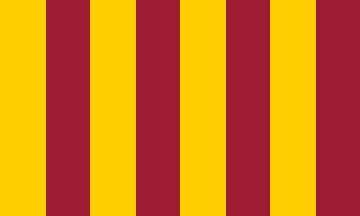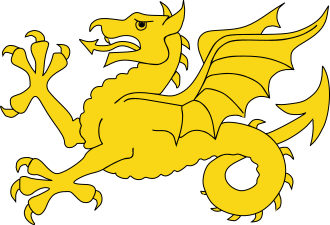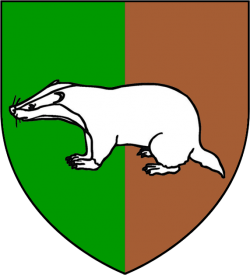THE HOUSE OF GLOUCESTER, KNOWN AS LI BAGEARD
The badger standard is a reference to the famous moniker used by Gerold, the first Earl of Gloucester.
The Earl of Gloucester is a man of humble origins when compared to other members of the English aristocracy. Originally from a small family of landholding knights, Gerold, dubbed "The Badger" due to his unnatural hair colouring, mortgaged his family estates in Normandy and joined William across the channel. Serving as a member of the Duke's retinue, Bageard distinguished himself at Hastings fighting at his side, and was awarded with a modest grant of land for his battle prowess and proven loyalty - apparently, he was responsible for the death of Gyrth Godwinson, hence his substantial reward for a man of his low rank. Gerold went on to take Edgar the Atheling under his wing as a member of his retinue, and spent the early years of William's reign on campaign with the boy at his side, acting as his tutor and guardian. Eventually, Li Bageard became the King's marshal following the defeats at the Wye, and led the Normans to victory outside the walls of York even as King William lay bleeding in the dirt alongside his son.
The fortunes of Li Bageard were, at this point, in danger of a catastrophic reversion. If the English caught word of William's death and Robert's fatal injury, the Normans were finished, and as vassals of William they would certainly be driven out of the isle by the rejuvenated and reinforced Saxons. Fortunately, Gerold had a potential king right in his lap - and with many of the Norman peers indisposed, he was able to pressurise the remaining lords to acclaim Edgar as the rightful King of England, a choice that ultimately brought England peace and not only secured Li Bageard's position but advanced it. For Gerold was named the first of the Norman earls: Gloucester was granted to him, as well as substantial domains upon the marches. This signalled the beginning of the political dominance that Gerold's family would exercise over England. Grants of land and title were heaped upon Li Bageard and his sons. Not without, merit, either, for they loyally supported the King and aided him in subjugating Normandy, ending the threat of Mortain for all time. Gerold is undoubtedly England's premier Earl, and his network of marriage alliances and gentleman's agreements truly make him the second man in the country, his family having a presence in both England and Normandy.
Family Patriarch: Gerold Li Bageard
Held titles: Earl of Gloucester (Gerold) Earl of Dorset (Mar) Count of Mortain et Alencon (Richard)
Area of Influence: The Welsh marches, south-western England, and western Normandy.
THE HOUSE OF GIFFARD
The Giffards were perhaps the most venerable of William's companions in terms of reputation. Old Walter Giffard was a respected warrior, a famed veteran of many campaigns against both Christian and Moslem alike. As a maternal cousin of Duke William, he was among the most pre-eminent of his followers, and his experience as a soldier was well used at Hastings. Granted lands in southern England, Giffard immediately began to plan to expand his dominions into Wales; plans that were cut short by the northern rebellion. Giffard's castle at Goodrich was attacked and seized by the English, with Walter himself killed in the fighting by a housecarl's battle axe, and his son captured in battle. Walter's son William succeeded him, and rode at the side of William when he went to meet the Saxons before York. His marriage ties with Gerold li Bageard compelled him to support Edgar Adelin as King, though his brother did not share that view and followed Robert de Mortain into exile. Nonetheless, William benefited from this good judgement, and was named by the King as Earl of Hereford. Since then, Giffard has served with the King against Mortain and now prepares to march across the Welsh border to finally put his father's dreams of conquest into action, under the direction of Gerold li Bageard.
Family Patriarch: William Giffard
Held titles: Earl of Hereford
Area of Influence: The Welsh marches.

Richard FitzGilbert was the son of Normandy's steward, Gilbert of Brionne, and was a companion of his kinsman the Duke during his youth. Unfortunately for Richard, his father was murdered in 1040 - as was common for a young Duke's steward - and so Richard and his brother were forced to flee to Flanders. For some time they dwelt there as exiles, before returning to Normandy once William had come into his own. Richard was awarded several lordships in Normandy, and was among those nobles deep within William's counsel. Richard accompanied William across the channel and fought valiantly at Hastings, and was awarded substantial grants of land in southern England for his efforts. Richard began referring to himself as "de Clare" or "de Tonbridge" in reference to his English lands, and was a very voracious and ambitious member of the English nobility. He fought at both the Wye and at York, suffering life threatening wounds that left him indisposed whilst the debate on the succession raged. In the end, Richard accepted Edgar's rule, perhaps showing a mercenary streak in the manner in which he abandoned his kin to support this new man as king. But not can say that de Clare has not profited from proving his loyalty. Richard led the vanguard at the battle of the Meres against Mortain, and his son Gilbert, a member of the King's household, personally saved the King's life by cutting down the leader of a party of knights sent to murder him upon the battlefield. Richard's heir was rewarded with the hand of the King's sister, Cristina, and was named Earl of Shrewsbury with extensive domains in the Welsh marches being granted unto him. The de Clares have risen to be among England's most powerful comital families, and possess the familial connection to the King that Li Bageard currently lacks. Whilst the two have not come to blows yet, it is surely only a matter of time until England's two premier families begin competing for influence in the regions they share influence in.
Family Patriarch: Richard FitzGilbert de Clare
Held titles: Earl of Shrewsbury (Gilbert) Baron of Clare and Tonbridge (Richard)
Area of Influence: The Welsh marches, south-eastern England.
THE HOUSE OF DE VERE
The De Veres were founded by a certain Aubrey, or Albericus, who followed William across the channel in search of fortune in England. After fighting notably at Hastings, Aubrey was rewarded with a grant of lands in southern England, and was trusted enough to serve as the King's treasurer - a position he would retain for many years to come. Aubrey's military feats are less than distinguished, though he was known by many as a prudent manager of the royal finances. Upon William's death the Baron de Vere chose, with plausible reluctance, to support Edgar Adelin as king. De Vere duly continued to manage the treasury at Winchester with a measured degree of competence, and as a reward for these services he was granted the castle of Arundel, formerly owned by Lord Montgomery, and given the title of Earl. Though the King rules, it is Aubrey who ensures that he has the money to do so, for surely if he ever ran out everything the Earl has accomplished over his career would be on the line.
Family Patriarch: Aubrey de Vere
Held titles: Earl of Arundel
Area of Influence: Southern England.
HOUSE OF GODWIN, THE GODWININGS
The 'fighting man' banner was allegedly used by King Harold at Hastings, as well as his brother Tostig.
There is perhaps no English family of the present time that are greater in reputation than the scions of the earl Godwin. The son of a minor thegn, Wulfnoth Cild, Godwin rose to the highest ranks of England's nobility when he was named Earl of Wessex by King Cnut in 1020. One of England's three great earls, Godwin proved invaluable in keeping the country firmly in the iron grip of the Danes, and had a notable reputation as both a warrior and a man of sound counsel among both the English and Scandinavian subjects of Canute. Godwin particularly distinguished himself campaigning for Cnut against the Wends, and evidently held a high enough opinion of him to propose a marriage to his brother-in-law's kinswoman, Gytha Thorkelsdottir. Following Cnut's death, Godwin first supported Harthcnut before changing his allegiance to his older brother Harold, who unlike Harthcnut had no ties to Emma of Normandy's sons by Ethelred. The Earl's most infamous act is seizing the eldest of these sons and blinding them on Harold's orders; it was unfortunate then that the youngest of them should eventually succeed to the English throne. Edward the Confessor followed his half brother Harthecnut, and it was clear from the very beginning of his reign that his power would be limited by the vast influence Earl Godwin held all over the south of the kingdom. Edward's early reign is marked by a struggle for power between the two, for despite being his son-in-law the King chafed under the reins of the Earl of Wessex. Godwin was even exiled in 1051, but his return the following year all but ended the conflict between himself and the King in his own favour.
Despite Godwin's death in 1054, the trend continued. His son Harold was a more than able successor, and all but managed the affairs of England in the King's name. Godwinson saw to it that almost every earldom in England was filled by a member of his kin, and the monopoly of power that they held on the country meant that the fate of the succession was effectively entirely in Harold's hands by 1066. Despite his earlier promise to William and the intentions of King Edward, Harold filled the vacated throne by acclaim of the nobility. In truth, he was a capable king, and there was not many fine qualities he did not possess. He ably defended the north against the fearsome Hardrada and came close to defeating William at Hastings, but it was ultimately not to be; the line of Godwin looked to have gambled everything and lost. They were driven into exile, his eldest two sons Godwin and Edmund eventually joining the rebellion of the northern Earls against William's rule. During the conflict, the two brothers distinguished themselves greatly in the eyes of their peers. Godwin showed himself to have the battle prowess of his father in the fights against the Normans, winning against superior numbers at the Wye, whilst Edmund successfully brought his father's client kings in Wales into the conflict on their side. At the end of the conflict, they accepted Edgar as their king, and were allowed to remain by his side on the condition that they forswear any right they hold to England's throne. Godwin entered the King's household, and was eventually named Earl of Wessex in recognition of the position his namesake held. His brother likewise was elevated to the lofty position of East Anglia, somewhat restoring the fortunes of Godwin's line; though this does not compare to the mastery of England they held in previous years.
Family Patriarch: Godwin Haroldson
Held titles: Earl of Wessex (Godwin) Earl of East Anglia (Edmund)
Area of Influence: South-western England and East Anglia.
THE HOUSE OF D'AVRANCHES
Hugh of Avranches was the son of Richard le Goz, Viscount of Avranches, a Norman noble of some import. Hugh followed William across the channel with ships provided by his father and certainly distinguished himself at Hastings, for he was a granted a large parcel of lands in Cheshire, on the marches. It is unfortunate then that Hugh met an early end, killed in combat with the English rebels. William allowed Hugh's paternal uncle Gerald to succeed to his lands in his stead, and since the influence of the family has expanded. Gerald was rewarded for his reluctant support of Edgar with the title of Earl of Chester, and was given another substantial grant of land in the north. Though he served Edgar loyally and remained steward, Gerald attracted an unwanted reputation when he tried to claim the honour of Richmond on his own initiative. Rebuked by the King, he seeks to gain lands in Wales to compensate, though his efforts have been snubbed by his former ally Li Bageard.
Family Patriarch: Gerald d'Avranches
Held titles: Earl of Chester
Area of Influence: Welsh Marches

The banner is based off of a design Bede described as being on the tomb of Saint Oswald of Northumbria.
Descended from a line of Northumbrian kings, the High-Reeves of Bamburgh are pure blooded Saxons amidst a sea of Scandinavians, colonists from Denmark and Norway that settled around Jorvik during the long, intermittent periods it came under the rule of the vikings. Their fall from grace is intertwined with the only time period the Danes completely ruled over England, with Earl Uhtred of Northumbria murdered by Cnut and replaced by the Danish Siward, who slew Uhtred's kinsmen and married into the family to legitimise his rule. The family clung on and survived in the far north, with the main branch in Bernicia eventually surviving Cnut's reign and earning the appointment of High-Reeve and later Earl of Bamburgh. Beholden to Morcar, Earl Osulf followed the brothers into Fulford and again in their rebellion against William, distinguishing himself in battle in particular at the Wye. He defeated Robert de Mortain outside the walls of York, but could ultimately do little to prevent the rebels losing their bloody final engagement with the conqueror. Like the other Saxons, Osulf supported Edgar, and as proof of his loyalty ensured that Morcar was disposed of and sent into exile. Once again were the line of Uhtred masters of Northumbria, for the King effectively left northern matters in the hands of the Earl of Bernicia. Osulf secured the return of Cumbria from the Scots and negotiated the marriage between Malcolm and Margaret, as well as playing a notable part in the battle against Mortain at the Meres.
But the most notable role in that battle was played by Osulf's son, Maldred, who was cut down defending the King from a would-be assassin. A priory was raised by the King in his memory, and Osulf was duly appointed as Earl of all Northumbria thereafter.
Family Patriarch: Osulf Uhtreding
Held titles: Earl of Northumbria
Area of Influence: Northern England
HOUSE OF SIGWEARD
A statue of Waltheof, the son and heir of Earl Siward.
Little is known of the Danish Earl Siward of Northumbria, save that he was one of the new men delegated authority by King Cnut following his conquest of England, part of a triumvirate that consisted of himself and the earls Godwine and Elfgar. Strangely enough, Siward was the only Scandinavian appointed, perhaps because of Northumbria's substantial Anglo-Danish population. The likely source of his hazy ancestry is that he was another son of the Danish chief Thorgil Sprakling, and thus brother to the Jarl Ulf that wed Cnut's sister. This would certainly explain why the King would trust him enough to appoint him as the murdered Earl Uhtred's successor; trust that was well placed, for Siward ruled the north without much incident for his entire career. Nonetheless, his rule was not uncontested, and he certainly engaged in the old fashioned Danish custom of murdering one's political rivals: Uhtred's son Ealdred was killed to give Siward control over all Northumbria, and he married Ealdred's daughter for good measure. After Canute's death he retained his position, and remained aloof from the succession struggle between the sons of the old king, even ably serving the King Edward with remarkable loyalty. At Edward's behest, Siward restored the exiled Malcolm of Scotland to his rightful throne, stolen from his father by the Maormer Macbeth. Though victorious after some years of hard fighting, Siward's eldest son and heir Osbjorn fell in battle. Though he had another, Waltheof, he was born late in the Earl's life.
Thus when Siward quietly passed on Waltheof was considered too young to succeed him. Northumbria is a wild place, and no child could keep it together, and so the King saw to it that Tostig Godwinson was appointed in Waltheof's stead. Siward's son seemed to be destined for a monastic life, for this is where his education was directed, however his fortunes changed and he was appointed Earl of Huntingdon and Northampton shortly before William's conquest. Waltheof duly swore fealty to William after Hastings but played no part in the following rebellion for either side, though some whisper that the Earl was on the very cusp of joining the cause of Edwin and Morcar before their defeat at York. Since then, Waltheof has expanded his influence into his father's old domains in the north, and though he perhaps hoped to be named Earl of Northumbria the honour instead went to Osulf of Bamburgh, Waltheof's father in law. Still, Waltheof is amongst the most powerful of England's earls, perhaps only rivalled by his kinsman Osulf and Lord Gloucester, whose influence seems to touch every part of the Kingdom.
Family Patriarch: Waltheof Siwardson.
Held titles: Earl of Northampton and Huntingdon
Area of Influence: Southern midlands and southern Northumbria.
|
























 Reply With Quote
Reply With Quote




